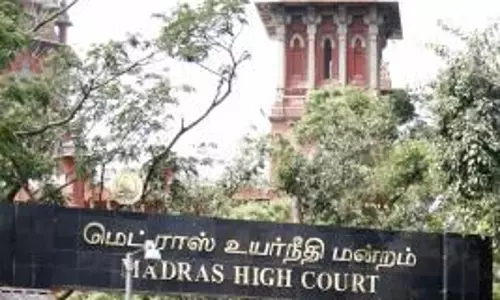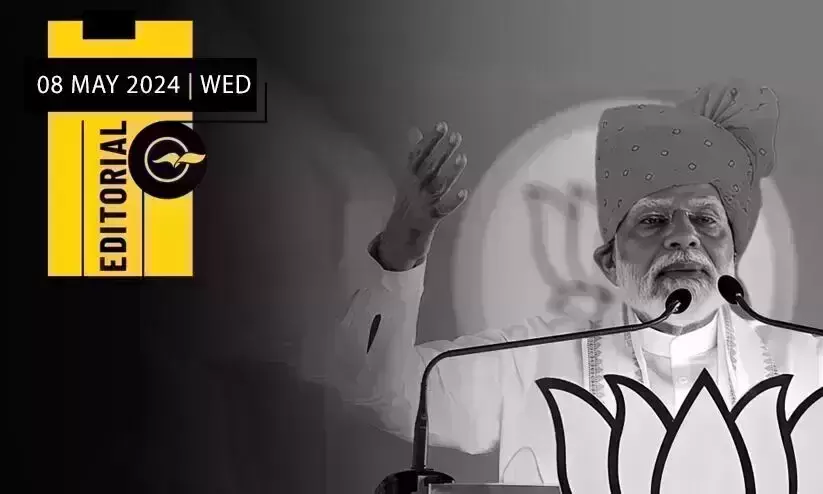
When campaigning crosses limits
text_fieldsAs the seven-decade-old Indian democratic system passes each general election, does it get more mature or get all the weaker? A democracy can be deemed robust and mature if and when all sections of the people are able to exercise their franchise freely and fearlessly and with the national good in mind. But then what is the prevailing situation? Even as electoral laws and rules remain precise, strict and almost impeccable, rulers and party leaders are seen throwing all of them into the winds to the point of questioning the very relevance of a secular democracy by intensifying foul propaganda.
The current spectacle causing concern is one of igniting the base sentiments of the populace and trying all tactics to vote or beat parties. And when it is the prime minister of the country himself who spearheads this dangerous march, what more to say about others? It does not need any explanation about how in the 2014 general election the far-right came to power with scant regard for the spirt of the constitution.
With the help of media controlled by corporates, they were inciting hatred and enmity towards religious minorities in the name of national security and defence. Even after winning majority and coming to power, it was not a fair and dignified regime that ruled India for the last five years under the leadership of Narendra Modi. His government, and its support base the Sangh Parivar, did all they could to further alienate the marginalized sections and tighten the grip of upper caste hegemony and culture. But, when the first term of its rule is coming to an end, they are coming to realize that the segment for whom they did all this is not able to bear with their deeds. They can also sense that the secular opposition, albeit weakened by disunity and dissipation, is being awakened to a sense and recognition of this thanks to their approaches. Nobody expects the panic-stricken far-right forces to assess matters with level-headedbess and correct their mistakes, simply because that is beyond their agenda and ability.
On the contrary, the Modi-Amit Shah duo looks all vowed to stubbornly cling to the hitherto traversed path – as proven by their pronouncements on each passing day. At the same time when they carry on the communal propaganda in the name of the Pulwama terrorist attack and the Balakot military action in response to that, the reaction of Modi camp to the most recent decision of Rahul Gandhi to contest from Wayanad constituency in south India, shows its unwillingness to face it with political composure. True, they need not take at face value the explanation of Rahul that he decided to contest from Wayanad in Kerala together with Amethi in UP, to prove that he is with the south Indian people as much as with the people of the north. And the Modi camp can reasonably allege too that the Congress's prime ministerial nominee decided to contest from Wayanad also out of fear of defeat in Amethi. They can also argue that wherever Rahul contests, he is sure to lose.
But when the prime minister of the country goes way beyond that, and says that Rahul fled to Wayanad out of fear from Hindu-majority Amethi, the Indian society will just wonder how narrow and communal Modi's mind stoops to be. In the first place, it is factually incorrect that Wayanad, which contains not only lthe prominent minority communities of the country, the Muslims and Christians but also adivasis, is not a Hindu majority region. But even if a secular political leader carries an interest and sympathy for the said backward and marginalized sections, how would that become a crime? When a sanghi leader who keeps repeating 'malice for none, nor placating' makes such a statement, isn't he claiming through it, plain and simple, that he is subject to the majority community alone? When Modi's fan, Amit Shah blames that the Congress is making Hindus terrorists, one cannot miss the malice in it either. It would be worthwhile to recall that when the judge of the Samjhauta Express blast case had to acquit the sangh parivar workers for want of adequate evidence - resulting from the inefficiency and derelection of the investigating tea - he had publicly expressed his deep remorse about the decision.
In Shah's eyes, the act that amounts to calling Hindus terrorists, is the comment of Congress spokespersons pointing their fingers to this judgement. In fact, it was the investigating agencies including the anti-terrorism squad of Maharashtra who discovered that Hindutva terrorists were the ones who planned and executed the blasts of Samjhauta, Malegaon, Makka masjid and Ajmer. But those who believe that since the victims were mostly Muslims the blasts were not terrorism but patriotism, can portray it only that way. In any case, if the Election Commission seriously wants to ensue that the election campaigning does not take a racial and communal dimension, invariably it has to rein in such irresponsible statements.























